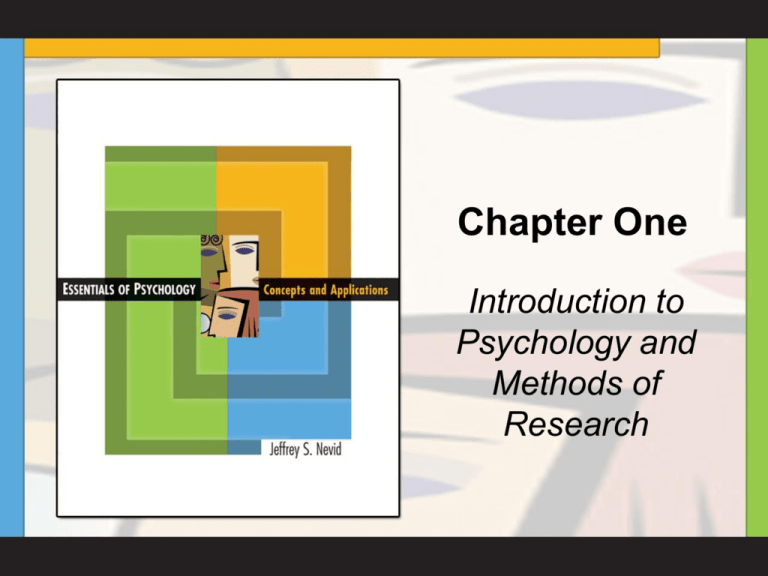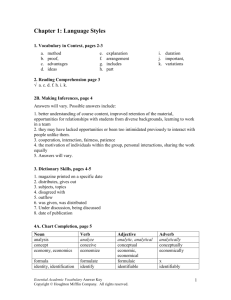
Chapter One
Introduction to
Psychology and
Methods of
Research
Did You Know That…
• One of the founders of modern psychology was
such a poor student that he was actually left
back a grade in school?
• A movement that once dominated psychology
believed that psychologists should turn away
from the study of the mind?
• The school of psychology originated by Sigmund
Freud holds that we are generally unaware of
our underlying motives?
Copyright © Houghton Mifflin Company. All rights reserved.
1-2
Did You Know That… (Cont’d)
• A major school of psychology was inspired by
the view from a train?
• A student successfully completed all PhD
requirements at Johns Hopkins University but
was refused a doctorate because she was a
woman?
• You can obtain listings and abstracts of articles
from major psychology journals by using your
home computer (and much of it is free of
charge)?
Copyright © Houghton Mifflin Company. All rights reserved.
1-3
Module 1.1
Foundations of
Modern Psychology
Module 1.1 Preview Questions
• What is psychology?
• What are the origins of psychology?
• What are the major early schools of
psychology?
• What are the major contemporary
perspectives in psychology?
Copyright © Houghton Mifflin Company. All rights reserved.
1-5
What Is Psychology?
• The science of behavior and mental
processes
• What makes psychology scientific?
• Evidence is valued over opinion and tradition.
• What is meant by “behavior”?
• Anything an organism does
• What are “mental processes”?
• Our private experiences
Copyright © Houghton Mifflin Company. All rights reserved.
1-6
Origins of Psychology
• The word psychology is derived from two
Greek roots:
• Psyche, meaning “mind”
• Logos, meaning “study” or “knowledge”
• Psychological inquiries can be traced back
to Ancient Greece.
• Remained largely of interest to
philosophers, theologians, and writers for
several thousand years
Copyright © Houghton Mifflin Company. All rights reserved.
1-7
Founding of Psychology as an
Independent Science
• Usually credited to the German scientist,
Wilhelm Wundt (1832-1920)
• Established the first scientific laboratory
dedicated to study of psychology in 1879
• Marked transition of psychology from
philosophy to science
Copyright © Houghton Mifflin Company. All rights reserved.
1-8
Figure 1.1: Psychology, the Early Days:
A Timeline
Copyright © Houghton Mifflin Company. All rights reserved.
1-9
Figure 1.1: Psychology, the Early Days:
A Timeline (Cont’d)
Copyright © Houghton Mifflin Company. All rights reserved.
1-10
Wundt, Titchner, and Structuralism
• Wundt was interested in studying people’s
mental experiences.
• Used method called introspection
• Edward Titchner (1867-1927) brought
Wundt’s teachings and methods to US.
• Wundt and Titchner are identified with
school of psychology known as
structuralism.
Copyright © Houghton Mifflin Company. All rights reserved.
1-11
William James and Functionalism
• William James (1842-1910) founded the
school of psychology known as
functionalism.
• Focused on the roles or functions that
underlie mental processes
• Why we do what we do
Copyright © Houghton Mifflin Company. All rights reserved.
1-12
John Watson and Behaviorism
• Watson (1878-1958) founded the school of
psychology known as behaviorism.
• Psychology should be a science of behavior
only.
• Believed that environment molds behavior
• By 1920s, behaviorism became dominant
force in American psychology.
Copyright © Houghton Mifflin Company. All rights reserved.
1-13
B. F. Skinner (1904-1990)
• Studied how behavior is shaped by
rewards and punishments
• Principles of learning apply to animals and
humans alike.
Copyright © Houghton Mifflin Company. All rights reserved.
1-14
Max Wertheimer and Gestalt Psychology
• Wertheimer (1880-1943) was fascinated
by the illusion of movement by objects in
the distance.
• Founded Gestalt psychology
• How does the brain organize and structure
our perceptions of the world?
Copyright © Houghton Mifflin Company. All rights reserved.
1-15
Figure 1.2: What Is This?
Gestalt maxim:
“The whole is greater than the sum of the parts.”
Copyright © Houghton Mifflin Company. All rights reserved.
1-16
Sigmund Freud (1856-1939) and Psychoanalysis
• An Austrian physician
• Founded view of psychology called the
psychodynamic perspective
• Focused on the unconscious mind
• Emphasized importance of early childhood
experiences
• Led to form of psychotherapy known as
psychoanalysis
Copyright © Houghton Mifflin Company. All rights reserved.
1-17
Contemporary Psychology
• Behavioral Perspective
• Social-cognitive theory
• Behavioral therapy
• Psychodynamic Perspective
• Humanistic Perspective
• “Third Force” in psychology
Copyright © Houghton Mifflin Company. All rights reserved.
1-18
Contemporary Psychology (Cont’d)
• Physiological Perspective
• Evolutionary psychology
• Cognitive Perspective
• Sociocultural Perspective
Copyright © Houghton Mifflin Company. All rights reserved.
1-19
Module 1.2
Psychologists:
Who They Are and What They Do
Module 1.2 Preview Questions
• What are the various specialties in
psychology?
• What changes have occurred in the ethnic
and gender characteristics of
psychologists over time?
Copyright © Houghton Mifflin Company. All rights reserved.
1-21
Types of Psychological Research
• Basic Research: Focuses on acquiring
knowledge, even if no practical
application
• Applied Research: Focuses on finding
solutions to specific problems
Copyright © Houghton Mifflin Company. All rights reserved.
1-22
Figure 1.3: Psychologists’ Areas of
Specialization
Source: American Psychological Association, Research Office, Current Major Field of APA Membership by Membership
Status 2002, Updated April 2004.
Copyright © Houghton Mifflin Company. All rights reserved.
1-23
Figure 1.4: Where Psychologists Work
Source: American Psychological Association, Employment Settings for PhD Psychologists: 2001,
APA Research Office. July 2003.
Copyright © Houghton Mifflin Company. All rights reserved.
1-24
Major Specialty Areas
• Experimental
• Comparative
• Physiological
•
•
•
•
•
Clinical
Counseling
School
Educational
Developmental
•
•
•
•
Personality
Social
Environmental
Industrial/
Organizational
• Health
• Consumer
Copyright © Houghton Mifflin Company. All rights reserved.
1-25
Emerging Specialty Areas
• Neuropsychology
• Clinical neuropsychology
• Geropsychology
• Forensic psychology
• Sports psychology
Copyright © Houghton Mifflin Company. All rights reserved.
1-26
Professional Psychology:
Becoming More Diverse
• Women pioneers
• Christine Ladd-Franklin (1847-1930)
• Mary Whiton Calkins (1863-1930)
• Margaret Floy Washburn (1871-1939)
• African American pioneers
•
•
•
•
Gilbert Haven Jones (1883-1966)
Francis Sumner (1895-1954)
J. Henry Alston
Kenneth Clark
Copyright © Houghton Mifflin Company. All rights reserved.
1-27
Figure 1.5: Ethnicity of PhD Psychologists
Source: National Science Foundation, Division of Science Resource Statistics, Science and Engineering Degrees, by
Race/Ethnicity of Recipients, 1992-2001, NSF, 04318, Project Officers Susan T. Hill, and Jean M. Johnson (Arlington, VA), April 2004.
Copyright © Houghton Mifflin Company. All rights reserved.
1-28
Figure 1.6: Women PhD Recipients
in Psychology
Source: American Psychological Association, Research Office, Demographic Shifts in Psychology, September 2003.
Copyright © Houghton Mifflin Company. All rights reserved.
1-29
Module 1.3
Research Methods in Psychology
Module 1.3 Preview Questions
• What is the scientific method, and what
are its four general steps?
• What are the major research methods
psychologists use?
• What ethical guidelines must
psychologists follow in their research?
Copyright © Houghton Mifflin Company. All rights reserved.
1-31
Figure 1.7: General Steps in
the Scientific Method
Copyright © Houghton Mifflin Company. All rights reserved.
1-32
Case Study Method
• In-depth study of one or more individuals
• Information drawn from interviews,
observation, or written records
• Problems with case studies:
• Limitations of memory
• Withholding of important information
• Concerns over making favorable impressions
Copyright © Houghton Mifflin Company. All rights reserved.
1-33
Survey Method
• Information gathered from target groups of
people through the use of:
• Structured interviews
• Questionnaires
• Importance of random sampling
• Problems:
• Limitations of memory
• Social desirability bias
• Volunteer bias
Copyright © Houghton Mifflin Company. All rights reserved.
1-34
Naturalistic Observation
• Direct observation of behavior in natural
environment
• Problems:
• May behave differently when aware being
observed
• Potential observer biases
Copyright © Houghton Mifflin Company. All rights reserved.
1-35
Correlational Method
• Used to examine the relationship between
two variables
• Correlation coefficient is a statistical
measure of association
• Can range from -1.00 to +1.00
• Positive vs. negative correlation coefficients
• Limitation: Correlation is not causation!
Copyright © Houghton Mifflin Company. All rights reserved.
1-36
Benefits of the Correlational Method
• Offers clues to underlying causes
• Can identify groups at high risk for
physical or behavioral problems
• Increases understanding of relationships
between variables or events
Copyright © Houghton Mifflin Company. All rights reserved.
1-37
Experimental Method
• Allows for investigation of cause-andeffect relationships
• Independent Variables: Factors that are
manipulated in an experiment
• Dependent Variables: Outcome variables
believed to be dependent on the
independent variable
Copyright © Houghton Mifflin Company. All rights reserved.
1-38
Experimental Method (Cont’d)
Participants
Random Assignment
Independent variable:
control group
Independent variable:
experimental group
Measure dependent variable: Is there a difference?
Copyright © Houghton Mifflin Company. All rights reserved.
1-39
Experimental Method (Cont’d)
• Controlling for placebo effects
• Controlling for expectancy effects
• Single-blind and double-blind procedures
Copyright © Houghton Mifflin Company. All rights reserved.
1-40
Anatomy of a Research Study:
To Shoot or Not to Shoot?
• Study Hypothesis
• What they predicted would occur
• Procedure
• What they did and how they did it
• The experimental design
• Results and Discussion
• What they found and what it means
• Results of the study
• References
Copyright © Houghton Mifflin Company. All rights reserved.
Continue
1-41
Experimental Design in Police Officer’s
Dilemma Game
Race of Target
African
American
Object
White
Gun
No Gun
Return
Copyright © Houghton Mifflin Company. All rights reserved.
1-42
Figure 1.8: Reaction Times in Police
Officer’s Dilemma Study
Source: Adapted from Corel et al, 2002.
Copyright © Houghton Mifflin Company. All rights reserved.
1-43
Figure 1.9: Fateful Decisions:
The Role of Stereotyping
Source: Adapted from Corel et al, 2002.
Copyright © Houghton Mifflin Company. All rights reserved.
Return
1-44
Ethical Principles in Psychological Research
• Purpose of code of ethics is to respect the
dignity and welfare of clients and research
participants.
• Role of ethics review committees
• Role of informed consent
• Use of deceptive practices
• Importance of confidentiality
• Ethical guidelines for animal research
Copyright © Houghton Mifflin Company. All rights reserved.
1-45
Application: Module 1.4
Becoming a Critical Thinker
Module 1.4 Preview Question
• What are the key features of critical
thinking?
Copyright © Houghton Mifflin Company. All rights reserved.
1-47
What Is Critical Thinking?
• The adoption of a questioning attitude
• Careful weighing of evidence
• Thoughtful analysis of others’ claims and
arguments
• Requires a willingness to challenge
conventional wisdom and common
knowledge
Copyright © Houghton Mifflin Company. All rights reserved.
1-48
Features of Critical Thinking
•
•
•
•
•
Question everything.
Clarify what you mean.
Avoid oversimplifying.
Avoid overgeneralizing.
Don’t confuse correlation with causation.
Copyright © Houghton Mifflin Company. All rights reserved.
1-49
Features of Critical Thinking (Cont’d)
• Consider the assumptions upon which
claims are based.
• Examine sources of claims.
• Question the evidence upon which claims
are based.
• Consider alternative ways of explaining
claims.
Copyright © Houghton Mifflin Company. All rights reserved.
1-50
Thinking Critically About Online Information
• Don’t suspend skeptical attitude when
online!
• Ask questions such as:
• Who is posting the material?
• Is the source a well-respected institution or
one with no apparent credentials and perhaps
an ax to grind?
• Most trustworthy online information comes
from well-known scientific sources.
Copyright © Houghton Mifflin Company. All rights reserved.
1-51


